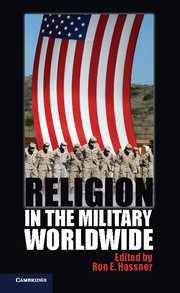Book contents
- Frontmatter
- Contents
- List of contributors
- Introduction
- Part I Rituals, Beliefs, and Practices
- Part II Religious Demographics in the Armed Forces
- Part III Religion and Military Operations
- Part IV Constitutional Challenges
- 8 United States I
- 9 United States II
- 10 Turkey
- Conclusion
- Contributor Biographies
- Index
- References
Conclusion
Promising Themes, Future Approaches
Published online by Cambridge University Press: 05 June 2014
- Frontmatter
- Contents
- List of contributors
- Introduction
- Part I Rituals, Beliefs, and Practices
- Part II Religious Demographics in the Armed Forces
- Part III Religion and Military Operations
- Part IV Constitutional Challenges
- 8 United States I
- 9 United States II
- 10 Turkey
- Conclusion
- Contributor Biographies
- Index
- References
Summary
In 1963, Gabriel Almond and Sydney Verba published a social science classic, The Civic Culture: Political Attitudes and Democracy in Five Nations. That book, a comparison of the political cultures of five countries (Mexico, the United States, the United Kingdom, Italy, and Germany), gave birth to a half-century of comparative and domestic political studies, including recent literature by foremost scholars on topics such as civic trust and social capital. Reading this volume on national militaries – and their institutional as well as supportive national cultures – reminded me of The Civic Culture in numerous ways. This book is also a comparative approach to cultures in diverse countries and, similar to The Civic Culture, it focuses on political subcultures, a sense of patriotic duty or obligation to participate, political allegiance, organizational membership, and socialization. The volume in your hands might have been written as a military offshoot of that social science milestone, because it clearly focuses on comparative national military cultures. As suggested later in this conclusion, as with The Civic Culture, this book’s approach should be extended to other countries in a systematic fashion and its findings replicated in these countries a decade hence.
This book is the first, to my knowledge, to compare the religious environment in which specific national militaries function. The chapters provide keen insights into some of the world’s most important militaries by any standard: largest militaries (India, Pakistan, the United States, and Turkey); top military spenders (the United States, the United Kingdom, Japan, and India are all in the top ten, and Canada, Turkey, and Israel are in the top twenty); countries with the highest number of deployed United Nations peacekeepers (Pakistan and India); most experienced in recent foreign deployments (the United States and the United Kingdom); not to mention active members of the world’s elite alliance – the North Atlantic Treaty Organization (Canada, the United States, the United Kingdom, and Turkey). This chapter introduces the multidimensionality of the religion-conflict nexus, advances a number of summative themes drawn from previous chapters, and suggests several vectors for future research.
- Type
- Chapter
- Information
- Religion in the Military Worldwide , pp. 227 - 240Publisher: Cambridge University PressPrint publication year: 2013
References
- 1
- Cited by



